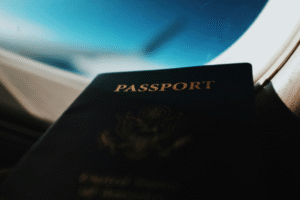Immigration is one of the most significant decisions anyone can make, and requires a lot of planning. Although most immigrants focus on forms, interviews, and visa requirements during this process, other elements play a big role in making sure an easy transition into their new country. Neglecting these important details could result in unexpected complications further down the line. In this blog, we will look at all the puzzle pieces to keep in mind when planning your move abroad.

Photo by Blake Guidry on Unsplash
Financial Planning for Your New Life
Immigration can be costly. Beyond visa applications and moving expenses, it’s important that you consider how you will cover ongoing living costs once you are settled in the new country. Researching costs of living, currency exchange rates, and potential hidden fees is extremely important. Questions such as “Can my savings accommodate unexpected expenses?” and “How long am I planning to rely on those savings before finding another source of income?” should be considered when planning. Also, it’s worth taking time to consider if you will open up a local bank account in your new country or if you will need to transfer funds. Each country has different banking regulations, making navigating them much harder without proper preparation. An excellent financial roadmap is a huge piece of the puzzle to an effortless immigration move.
Language and Communication Skills
Language is your gateway into new environments, so if the primary language spoken at your destination is one you’re unfamiliar with, it might be time to brush up on it. While translation apps offer some help, nothing beats being able to communicate directly with locals through speaking their native tongue. Language courses (online and in person) can help you a lot, while familiarizing yourself with cultural phrases and idiomatic expressions is also important for easier integration processes.
Cultural Adjustments and Local Etiquette
Immigrating to a new country involves more than simply packing your things, it also means adapting to its culture, customs and way of life. Each country has its own set of unspoken rules and social norms. Behaviors that are common in your home country could come across as inappropriate elsewhere. Take time to educate yourself on traditions, holidays and manners relevant to your immigration country such as tipping customs in restaurants, greeting protocols or punctuality expectations to avoid cultural faux pas. Doing this will not only make your transition smoother but will earn respect from your new community members.
Housing and Accommodation
Searching on real estate websites isn’t enough to secure your housing abroad. Each country has different rules on property markets, rental agreements and legal regulations that must be considered before signing a rental contract or making a commitment of any sort. Before moving, research neighborhoods that best match up with your lifestyle and budget. Is it close to public transport, schools and are there essential services nearby? Is temporary accommodation available first so as to give yourself plenty of time and flexibility before committing more permanently?
Employment and Career Considerations
Securing employment when immigrating is another important piece to the big puzzle. Going through unfamiliar application processes, understanding workplace culture in your destination country, and dealing with work permits can all be frustrating challenges. Make sure your qualifications are recognized in the country and find out what additional certifications or training might be needed to meet the local standards. Networking may also be very useful here. Join online groups or attend industry events prior to your arrival to get a headstart.
Healthcare and Insurance
Healthcare is a very important aspect of life that should never be underestimated. Each country offers its own healthcare infrastructure. Some may require residents to purchase private health insurance while others offer public plans. Before immigrating abroad, research the healthcare services available to you as well as how insurance works. Taking out sufficient coverage prior to arrival can give you a lot of reassurance should any medical assistance become necessary. Also make sure that all your vaccinations or health checks that may be mandatory are done before entering the country.
Legal and Administrative Tasks
Immigration comes with its fair share of administrative responsibilities that go far beyond simply applying for visas. From registering your address and applying for tax identification numbers to becoming familiar with the local laws that will be affecting your everyday living. Keep a strict vigil over deadlines for residency permits, immigration renewals, or any other official documents required of you when living abroad. Make this task a priority in your planning timeline since they often serve as the bases of other aspects of life abroad such as housing and employment. Getting the help of expert notaries can greatly simplify the administrative burdens associated with immigrating. Notaries provide phenomenal services by authenticating documents, drafting contracts and making sure all legal documentation complies with local regulations. Using their expertise can save you a lot of time and help you avoid errors caused by unfamiliarity with foreign legal systems. Using their services ensures that all documentation is accurate, professionally handled and legally binding, giving you a lot of reassurance during a complex relocation process.
Building a Support Network
Immigrating can be isolating, so it is very important to build a robust support system when moving abroad. Making friends, joining local expat groups and joining community organizations are all effective strategies for mitigating feelings of isolation while helping you with integration. Social media platforms or forums dedicated to expats or immigrants can be your starting points and knowing there is someone waiting to offer advice or companionship can provide you with comfort during moments of uncertainty.
Mental and Emotional Prep
Immigration requires you to do both mental and emotional preparation. Saying goodbye to familiar environments often causes homesickness or other emotions to surface. Taking proactive measures, like practicing mindfulness or finding support groups is important in meeting this challenge. Although often not addressed openly among immigrants, emotional shock is common. Give yourself grace during this adjustment period while celebrating small victories along your journey to new beginnings.

Photo by Jan Tinneberg on Unsplash
Conclusion
Immigration can be a tough but rewarding journey. Getting a visa may be important, but its true impact will only become clear once all aspects of your move have been considered. Financial stability, cultural acculturation, language skills development and healthcare provision all become important pieces to the bigger puzzle. Paying attention to details (big and small) can help you not just have an easier transition but a fulfilling future life as well.
